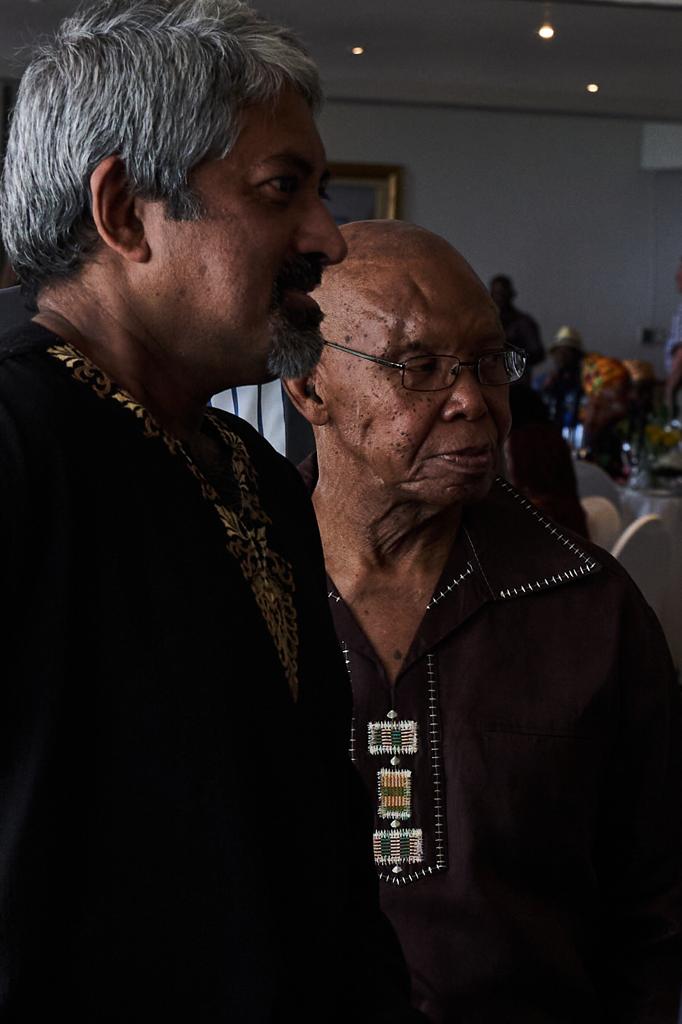
1961 was an interesting year for a number of reasons. That was the year I was born, as were luminaries such as Barack Obama and Mogoeng Mogoeng. That was the year apartheid South Africa declared itself a republic and cut ties with the commonwealth. And that was the year Joseph Nong Thloloe became a journalist.
By the time I got my first byline in 1980, Joe Thloloe was already a legend among my colleagues. (They were all elder colleagues at the time, I was 19 years old.) The history of media in our country was not something taught to us at school, and so for the first time, I learned of the founding of the Union of Black Journalists and that Joe Thloloe was its president at the time of its banning. I learned of the founding of the Writers Association of South Africa, and how that evolved into the Media Workers Association of South Africa. Joe Thloloe’s name along with the names of Percy Qoboza, Aggrey Klaaste, Joe Latakgomo, were spoken of with deep respect; almost reverence.
Strangely though, my first proper engagement with Bra Joe did not happen here in our country. I had left the country with the State of Emergency in 1986 and was an undergraduate student in Princeton. Bra Joe and Thami Mazwai came to Princeton as visiting fellows at the Woodrow Wilson School of Public and International Affairs. I was a bit of a hot head back then — there’s that particular arrogance that all of us have in our 20s — and the thing I remember most of that conversation with Bra Joe was the sense of calm he was able to infuse into discussion. There was an air of quiet authority about him; not the authority of position, but the authority of knowledge.
I returned to South Africa in 1994 a few short weeks before that momentous day of 27 April. I did not cross paths with Bra Joe over the rest of the decade. Then in late 1999, Quraysh Patel drafted me into his team at ETV; not as a journalist but as head of corporate communications. Within the following year, Quraysh also brought Bra Joe on board to head up the breakfast show eNews Morning Edition.
Following the tumultuous events of 11 September 2001, Quraysh out of the blue called me one morning and told me that he was appointing me to run eTV News with immediate effect. This was the evening news operation which was run separately to the morning team headed up by Bra Joe.
Six months later, eNews Live@7 overtook SABC’s 8 o’clock news in the ratings for the first time. But I was exhausted; working every day starting with the morning diary conference at 8h30 and leaving after the 10 pm bulletin.
And so, I had a conversation with Quraysh where I said to him, “I think you should make Bra Joe head of news.”
Why, he wanted to know.
“I’m fighting two battles,” I said. “I’ve got people within my team who are trying to sabotage what I am trying to do, and I have a relentless external campaign against us from the Mail and Guardian and Business Day and others. Bra Joe should head up all of news; not just Morning Edition. He should be our public face. Most importantly, I respect and trust him.”
It’s probably the only time in my life that Quraysh listened to me. Shortly thereafter, Bra Joe was appointed Editor-in-Chief and became my boss.
Bra Joe was the best of bosses. His interventions were frequent, but always at the level of questioning whether things could be done better. I do not recall ever receiving a direct instruction from him; he would say “I think we should do this…”
The few short years that followed were glory days. We did things that had never been done in our country before. We set up the eNews Journalism training programme. We briefly became a 24 hour news channel when the US invaded Iraq. We covered the Hefer Commission live. Bra Joe himself wrote and produced a documentary on Robert Sobukwe. We moved the news operation from Cape Town to Johannesburg. By the time the 2004 elections put Thabo Mbeki in power for his second term, we had achieved a new milestone; we had double the ratings of SABC’s 8 o’clock news forcing them to move their bulletin to 7 to try to compete with us. Also in 2004, 5 of the 9 Vodacom Journalist of the Year awards for television went to graduates of our training programme,
Then in 2004, there was a palace coup at ETV. Quraysh had left us, and Bra Joe and I had to part ways. In 2007, I became head of YFM. Within three months, I set up the Y Academy to train radio talent. Bra Joe was there to support me over the next ten years, coming in to guest lecture the Y Academy students and share his wisdom.
That brings us up to today where I still engage with Bra Joe at every opportunity. Most recently, he drew me into a project to create a space online where we are able to have meaningful conversations about how to take our country forward. I am awaiting further instructions.
I have one final insight to offer. A friend of mine, about a decade older, once asked me “Why do you rate Joe so highly?” I replied, “Joe is a gentleman in a profession filled with thugs.”
Bra Joe: I am deeply honoured to have you in my life. I am grateful for your mentoring, your wisdom, but especially for your love and your friendship. I hope you will continue to call on me, and I know I will always answer.
